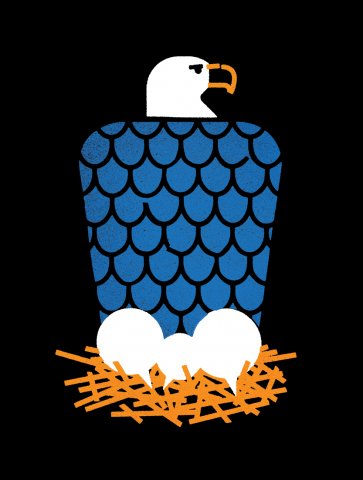The monolithic, three-story media wall in the lobby of Wallis Annenberg Hall serves as an easy visual metaphor: Its towering presence always conveys that you’re at the center of something. When big news is breaking, USC Annenberg students, faculty and staff know they can gather to witness it here — especially if that news is about national politics. During the 2016 election season, all three presidential debates were shown live on the media wall, with students packed onto three floors engaging with faculty in post-debate discussion.
On Sept. 27, 2018, the lobby teemed with yet another crowd — this one completely impromptu. The throng, most of them students, stood absolutely riveted by the two most prominent speakers on the media wall’s screen: Brett Kavanaugh and Christine Blasey Ford.
As Ford testified to the Senate Judiciary Committee about her allegation that Supreme Court nominee Kavanaugh had sexually assaulted her when they were both teenagers, and Kavanaugh, in turn, denied that allegation, the crowd whispered and muttered to one another — conversations that grew more animated after the testimony had finished.
On the periphery of the space, national and international news crews had set up cameras to capture students’ candid reactions to the hearings, occasionally interviewing individual students about the real-time political drama playing out before them. Not only were media outlets eager to learn how USC Annenberg students viewed the controversial nomination, the hearings dominated coverage in the student-run Annenberg Media and Daily Trojan in the weeks before and after Kavanaugh’s confirmation to the high court.
That day’s events are just one example of how USC Annenberg students, faculty and alumni were, are, and will continue to be engaged with the most pressing political contests and debates in the United States.
“Going back to the beginning, politics is in this school’s DNA,” said Geoffrey Cowan, University Professor, Annenberg Family Chair in Communication Leadership, and former USC Annenberg dean. “Every aspect of politics has always been a central issue here.”
The school not only prepares undergraduate and graduate students to be versatile storytellers who can shape political narratives and messages, it also produces rigorous critical thinkers who can address complex questions of politics and policy. As alumni, they have carried those lessons with them as they became journalists delving into the machinations of Washington, D.C., communicators shaping and studying political messaging, or public relations professionals crafting candidate and advocacy campaigns.
“Journalism, communication and public relations form a triad that keeps the public informed about what’s going on in government, and how that affects society as a whole,” said USC Annenberg alumna and former KCBS investigative reporter Jacki Wells Cisneros.
And often, the most important lessons are about a lot more than who wins and who loses. “Covering the horse race of politics is the easy way out,” noted journalism adjunct instructor Marc Ambinder, a longtime political reporter. “The real question we want to ask ourselves — and want our students to ask — is, what do we owe to our democracy as communicators?”
The classroom and beyond

Whether or not the class actually has “politics” in the title, political issues, candidates, movements and messages are all but assumed to be among the teachable moments students and teachers will discuss and dissect. An “Introduction to Strategic Public Relations” class might examine how a politician’s PR team handled a crisis. “Advanced Investigative Reporting” might discuss dealing with a federal agency that isn’t responding to a Freedom of Information Act request. “Campaign Communication” might analyze the best ways to shape a candidate’s messaging.
This Spring, Ambinder taught a national security reporting course with Joshua Campbell, who once served as special assistant to then-FBI Director James Comey. After accepting an invitation to talk to the class, Comey also took questions in USC Annenberg’s Media Center from students working in the newsroom that morning.
Ambinder, The Week’s editor-at-large and a contributing editor for The Atlantic and GQ, formerly served as White House correspondent for National Journal, chief political consultant for CBS News, and politics editor at The Atlantic. He’s seen the evolution of the relationship between politicians and the press, and is making sure his students are able to adapt. “We’re trying to figure out how to do effective political journalism in this new environment,” Ambinder said. “A lot of that is experimental, and a lot of that will involve requiring students here — as well as faculty and alumni — to question some of the core tenets and principles of political reporting, and to be open to new ideas.”
He’s not talking about changing the core ethics of journalism here. “I think the ethics of the profession seem to be holding up pretty well: Always tell the truth, hold powerful interests accountable, constantly question, and never assume,” Ambinder explained. “I mean the idea that we have to go out of our way to make sure a story seems ‘balanced’ before it can be published, or the principle that ‘both parties do it.’ If you’re following those kinds of principles just because you’re afraid that people will think you’re X, Y or Z, and not in service of accuracy and truth-telling to your audience, then those principles need to be disregarded.”
USC Annenberg creates many opportunities for students to put the principles of political communications, public relations and journalism into action: class assignments, internships, directed research. A particularly inspiring workspace for all of the school’s aspiring communicators is the glass-walled suite of assignment desks, audio and video broadcast studios and TV monitors that is USC Annenberg’s Media Center.
Opened in 2014, the media center serves a triple role at the school: classroom, laboratory and incubator, where students produce stories for Annenberg Media on multiple platforms. Last year, Christina Bellantoni was named the media center’s new director; her particular expertise sends a strong signal about the kind of training students are receiving there. Having served as political editor of PBS NewsHour and editor-in-chief of Roll Call, Bellantoni was most recently an assistant managing editor at the Los Angeles Times, leading the politics team.
Bellantoni, who regularly appears on national political talk shows, believes that two factors can help journalists’ credibility with the public, especially when it comes to coverage of politics. First, greater diversity of backgrounds and perspectives within newsrooms themselves; and second, greater transparency about how stories are reported. “It would be helpful for newspapers to stop pretending people there don’t have opinions,” she said. “That doesn’t mean you have to be partisan media, but you can at least be a little bit clearer about where people are coming from or how decisions are made in the newsroom.
“I wanted to attack these issues at the Los Angeles Times, but we never could because of the daily news deadlines,” she added. “So, I thought, what better place than USC Annenberg to think about these really big challenges in the industry that I love so much?”
Having edited both young reporters and seasoned pros her entire career, Bellantoni sets a high bar, both in her classes as a professor of professional practice, and as the head of the media center.
“My best advice for anyone wanting to cover politics is, go deep on everything,” Bellantoni said. “You can’t be shallow when it comes to politics. When you’ve asked every question, go back and ask five more. People want deep storytelling that helps them understand the world around them — and that includes knowing the truth, whatever that truth may be.”
One of her earliest initiatives as media center director was the creation, in response to student demand, of a Politics Desk for Annenberg Media. Reporters and editors from that desk covered not only the 2018 midterm elections, but on-campus events, such as a Fall appearance by controversial conservative speaker Ben Shapiro.
“There were protests, and there were also many, many students in a very long line to hear what he had to say — not because they were necessarily subscribing to everything he had to say, but because they wanted to expose themselves to it,” Bellantoni said. The student journalists who covered that event had a responsibility to cover it fairly and include all perspectives, whatever their own beliefs might be. “Sometimes, that’s easier said than done,” she added.
Bellantoni stresses that student reporters need to be more careful with word choice when writing about politics than almost any other subject. “Show, don’t tell. That’s a basic journalistic tenet — and it allows you to be fairer when covering politics.”

Connecting with newsmakers
Providing students access to state-of-the-art facilities, expert faculty, and prominent guest speakers and lecturers are among the many ways USC Annenberg prepares students to lead the national conversation around politics. “During the time that I’ve been here, which is over 20 years, we’ve seen the tools change,” Cowan said. “And as the tools have changed the way we think about politics, we have stayed current and remained experts on political communication.”
Cowan’s career as both a journalist and an academic is inextricably connected with U.S. politics, from his work on reforming the Democratic Party’s presidential nominating process while still a law student in 1968, to serving as director of Voice of America under President Bill Clinton. After serving as dean of USC Annenberg from 1996 to 2007, Cowan became founding director of the school’s Center on Communication Leadership and Policy (CCLP).
CCLP’s mission to engage students with communications professionals and the political process is, by necessity, a bipartisan one. In collaboration with media partners, the center’s student fellows covered both the Republican and Democratic presidential conventions in 2008, 2012 and 2016, and will do so again in 2020. CCLP also brings a wide range of speakers from the world of politics to campus, both at public events and in classrooms.
In March, CCLP and other politically minded campus groups hosted Massachusetts Democratic Congressman Joe Kennedy III in Wallis Annenberg Hall’s Forum. “In my own class in a couple of weeks, my guest will be Karl Rove, it might shock you to hear,” Cowan — a lifelong Democrat — said of the well-known Republican campaign strategist. “It’s really important that students be exposed to a whole range of points of view.”
Engaged alumni and parents also help deepen and broaden the political conversations at USC Annenberg. R. Rebecca “Becki” Donatelli is a USC alumna (she earned a B.A. from USC Dornsife College of Letters, Arts and Sciences in 1975) whose relationship with USC Annenberg began when her daughter enrolled as a journalism major. A Republican political consultant, online political pioneer and founder of the Campaign Solutions firm, Donatelli recalls being impressed by how her daughter Elizabeth Donatelli (who graduated with a bachelor’s degree in broadcast journalism in 2004 and is now a broadcast and online journalist) learned the craft.
“They taught her how to run the camera, carry the camera, be a one-man band — how to get down to the actual mechanics of being a working reporter,” she said. “She was really prepared, as a graduate, to walk into any newsroom and get to work.”
When Becki Donatelli decided to help contribute to USC Annenberg, she knew she wanted to draw on her own expertise and connections to add to the conversation around politics and policy at the school. She has spearheaded two initiatives: First, the Donatelli Expert-in-Residence series brings leading figures in politics and political communications to USC Annenberg. Early highlights included Washington, D.C., luminaries such as political commentator Cokie Roberts and NBC Nightly News anchor Lester Holt. A recent appearance by Politico Editor Carrie Budoff Brown focused on the importance of facts above all else in today’s highly polarized political climate.
In addition to such “rock stars” at the top of their field, Donatelli says the Expert-in-Residence program also brings in speakers who might not be so well known, but who truly understand D.C. government and politics, and who can share their experience with students. “It is critical that these students be exposed to a variety of voices,” Donatelli said. “If you just hear one thing or one side, they will not be effective advocates or journalists.”
While the Expert-in-Residence series brings outside political experts to USC, Donatelli recently organized another initiative that does the reverse. A D.C. trip, first held this Spring, brought 19 students to the nation’s capital to meet with administration officials, members of Congress, and other government figures. The visit included a luncheon hosted by Donatelli at the Press Club, where students heard from a panel that included members of her Campaign Solutions team.
“The goal has always been to offer insight into how government works, and how the natural outcome of political campaigns leads to governance,” Donatelli said. “Right now, we have a divided government, and a divided government only works if all sides are willing to talk to each other and try to reach a compromise. The students on the trip got to see that in action.”
Media and messaging in real-world politics
Based on such curricular and extracurricular foundations, USC Annenberg alumni have been building successful careers in politics for decades.
Brenda Gonzalez, who earned a master’s degree in strategic public relations in 2017 and serves on the advisory board for the USC Annenberg Center for Public Relations, had already worked in government communications at the local, state and federal levels when she started her graduate studies. She knew that her degree would bring her skills she could use in her work as press secretary for then-California Attorney General Kamala Harris, but was surprised to learn how ubiquitous political conversations were, both inside and outside the classroom.
“I honestly did not think my classes would touch on political PR as much as they did,” she said. “In almost every class, we discussed the news of the day — which, of course, always had to do with politics.”

After taking the “Crisis Management in Strategic Public Relations” course with Brenda Lynch, an adjunct instructor and senior partner at Finn Partners, Gonzalez said she realized that no matter where she worked, she would need to have, and be able to execute, a crisis communications plan.
“The skills I gained from this class were so valuable to my political communications career,” she said. “Politics and PR go hand in hand.”
The same can certainly be said of journalism. Jacki Wells Cisneros, an alumna who earned her bachelor’s degree in communication arts and sciences in 1995, says the importance of well-trained, ethical, vigilant journalists to the political process is evident every day.
Cisneros adds that USC Annenberg gave her the skills she needed to excel at covering politics. “But I didn’t realize the responsibility that was on my shoulders until I was well into it,” she said. “It wasn’t until I started working at an investigative unit at KCBS that I really understood the need for political journalism, and the impact you could have.”
Her time as a working journalist also gave Cisneros an appreciation of the need for a diversity of perspectives in a newsroom, especially when it comes to the coverage of politics. After she and her husband Gil Cisneros won $266 million in the MegaMillions jackpot in 2010, they were determined to give back to the causes that meant the most to them — including USC Annenberg’s mission to train the next generation of journalists and communicators. The Wells Cisneros Scholarship goes to one Latino USC Annenberg student each year. “As Latinos, we felt that it was important that the stories of the fastest-growing demographic in the United States should be told at USC Annenberg,” Jacki Cisneros said. “It’s important in any workplace to have different perspectives represented, especially if it’s your job to tell stories and cover many different communities.”
The political expertise of USC Annenberg’s graduates is also keenly felt not just in the press corps covering the most contentious issues and campaigns, but also the people crafting the messaging for those campaigns.
Alumnus Steve Grand earned his M.A. in communication theory and research in 1990 and his Ph.D. in communication in 1995, but he had begun working as a media consultant on Republican political campaigns even before that.
“It’s like I was a really good tennis player, but I didn’t really understand the mechanics of why that was,” Grand said. “The master’s curriculum at USC Annenberg gave me a lot of helpful insights about running a business, including the business of government. On the Ph.D. side, I learned research methodology, which I put into my own research on visual metaphor and persuasion. I was able to put this academic theory behind what I was doing in the real world. In my doctoral work, I started breaking down the voter decision process and thinking about it in a rigorous academic way.” Grand says that working at USC Annenberg with such renowned professors as the late Ev Rogers and the late Jim Beniger left a lasting impression on him.
Active on several Republican Senate campaigns in 2018, Grand says he put his research to work helping a Super PAC in Josh Hawley’s successful campaign in Missouri against incumbent Democrat Claire McCaskill. “She was known for having a private plane and had gotten in some trouble for using it,” he said. “So, we designed this plane metaphor that literally flew through a lot of the campaign ads. The notion about a metaphor is that, in a very short amount of time — like a 30-second TV ad — you can say a lot of things.”
Grand came to campus shortly before the 2018 elections to speak with Bellantoni’s students in the Annenberg Media newsroom about political strategy and communication (he and Bellantoni had met teaching as Institute of Politics Fellows at Harvard’s Kennedy School), showing them some of his campaign ads and engaging with them about their messaging and effectiveness. He says that USC Annenberg’s tradition of fairness and vigorous debate allows students to learn from experts on politics on both sides of the party divide.
In addition to covering politicians and working for them, USC Annenberg alumni have also had an impact as elected officials themselves. Maryland Lt. Gov. Boyd Rutherford earned a master’s in communication management (along with his law degree) in 1990. Yorba Linda Mayor Tara Campbell, who in 2018 became California’s youngest female mayor, got her bachelor’s degree in 2015, double-majoring in political science and broadcast and digital journalism.
Long Beach Mayor Robert Garcia, who earned a master’s in communication management in 2005, says the messaging and communication skills he learned help him every day he’s in office. “I’m very grateful to have a communications background, particularly when it comes to crisis management issues,” he said. “I am also the ambassador for this city, and I learned a lot of those skills in my studies at USC.”
Garcia says that a class he took with Professor of Communication Thomas Hollihan was particularly formative for him as both a professional communicator and a politician. “The class helped me understand some of the theory behind my own personal political beliefs,” Garcia said. “Tom has a great way of explaining the foundations of both being a liberal and a conservative and what those really mean. I really walked out of that class understanding the reasons why I believe what I believe. I also came away understanding the importance of communicating your message appropriately in politics.”
Garcia emphasized that the lessons he learned at USC Annenberg about the shaping of political narratives remain relevant to this day.
“I am amazed that some of these themes that we discussed when I was a student, we’re living through right now,” Garcia said. “For any student that’s interested in political communications, or policy, or being part of the media covering the political discourse, USC Annenberg is a great place to be.”
This piece was originally published in the Spring 2019 issue of the USC Annenberg Magazine.
